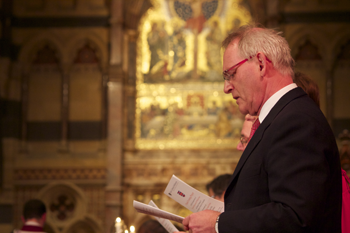ABM Archive Website
THIS WEBSITE CONTAINS ARCHIVE MATERIALS FOR HISTORICAL REFERENCE ONLY
For up-to-date information, including our latest appeals, news, and resources, please visit our current website.
General Secretary of the Anglican Church of Australia Retires
December 12, 2014

ABM recently interviewed Martin Drevikovsky, General Secretary of the Anglican Church of Australia, who will be retiring this month. During Mr Drevikovsky’s time as General Secretary, ABM has enjoyed a very cordial relationship with the General Synod office and will sadly miss him. We wish him well for his retirement.
Could you share some of your reflections on your role as General Secretary of the Anglican Church of Australia?
It has been a rare privilege to serve God and the Church as General Secretary of the General Synod for the last 6.5 years. I have appreciated the opportunity to be engaged in the Church’s life at this level, which is not open to many. Sitting behind the General Secretary’s desk, you get a unique view of the Church. While the role is interesting and rewarding in many ways, it is not for the faint-hearted. Nor is it a role for an unpragmatic idealist, no matter how hardy.
What have been some of the highlights or achievements over the years?
When I came into the role, I described myself as a builder who would like to concentrate on getting the most out of what we have in common. At the end of my time, there are signs of positive change in intent and dynamics of relationships in the Church. This engenders some optimism about how the Church will deal with what lies ahead. Although there are some indications, it is not clear yet where God is leading the Church, but then again we are in a position where the journey may be just as important as the destination. I am well satisfied that the infrastructure supporting the General Synod now provides a solid platform for addressing the many challenges that the Church faces nationally. It is gratifying to have been part of these developments.
What were some of the challenges?
Not having had a background in the General Synod, there was an initial period of intense learning and adjustment. Limits on resources constrain the scope of what can be achieved and progress can be slow. The breadth of responsibilities in the role makes it difficult at times to get on top of issues as much as I’d like. Decisions that are made outside the formal decision making structures of the Church can complicate their work. So does the confusion between cooperation which is necessary to achieve consistent policy and practice in areas common to the whole Church on the one hand and the bogeyman of centralism, which many fear would erode diocesan autonomy, on the other. This inhibits a rational approach to a number of practical issues which the Church faces. An ineluctable flow of issues and events presents the recurrent challenge of discerning priorities and requires some stamina.
Did your previous position help you in this role?
Thirty-odd years of practice as a litigation solicitor prepared me for a number of facets of the General Secretary’s role. The process of preparing for a session of General Synod or for meetings of the Standing Committee or its Executive is not unlike getting a case ready for trial. I suppose it’s easier for an experienced lawyer than for others to assimilate and analyse voluminous new material and to distil the heart of things so that decision makers are clear about what they have to do. It also helps if your professional background teaches you that your responsibility is to present the case the best you can but you are not responsible for the outcome when many other factors beyond your control are at play.
What do you enjoy most about your role?
Without doubt, the most rewarding aspect of my time as General Secretary has been working with so many committed and competent Christian people. I admire the sacrificial service given by so many, particularly lay people who have demanding occupations. I have enjoyed a high level and quality of support. The collegiality of the Bishops and the congeniality of the General Synod Office have been a pleasure. The wide range of issues I have had to deal with has provided both variety and challenge. I am grateful for dedicated and capable staff who have worked well to get the job done, especially in difficult periods.
What are your plans for your retirement?
Retirement is an ambiguous term for someone like me. Although I won’t have a full time job, I expect to be keeping busy. I plan to be involved in some projects. I will sit on some committees and boards and am open to other ministry opportunities. (Anything involving snow sports, red wine and dark chocolate would do.) I want to be more organised and intentional in my reading. My wife and I have elderly parents and relatives who need more care than in the past. We will participate in a short-term mission overseas in June/July. Then there’s the bucket list, which probably looks like everyone else’s except, perhaps, that I’d like to learn how to make wooden skis.

Martin Drevikovsky at the inauguration of Philip
Freier as Archbishop of Australia.
© ABM/Vivienne For 2014
(Below: From the Anglican Church of Australia’s website)
Behold, I make all things new…
Once again, we advance through Advent to Christmas.
Here in the Antipodes, the celebration carries extra significance for many because it coincides with the summer break. We experience the pressure of the end of the financial year, but with goodwill and hope one doesn’t normally associate with the mundane. Transformation and transcendence are central to the Christmas message. Jesus: from baby to authoritative teacher and charismatic leader; from manger, to an itinerant life, to heavenly kingship; from vital earthly life to gruesome death and beyond to heavenly life. And for us: the opportunity for damaged people to become whole. These are connecting points with hope, the essence of Christmas.
This Christmas brings change for me. As my term as General Secretary comes to an end, I express my appreciation to the many who have supported me in my role.
Best wishes for peace at Christmas.
Martin Drevikovsky
General Secretary


